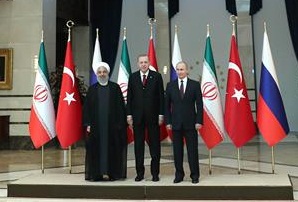
RNA - The three presidents - Iran’s Hassan Rouhani, Russia’s Vladimir Putin, and Recep Tayyip Erdogan of Turkey, gathered in Ankara, where they pledged to cooperate on reconstruction and aid efforts. They also vowed to protect Syria’s territorial integrity. They called for more support from the international community and emphasized their opposition to “separatist agendas” in Syria. Few points are worth mentioning with regard to this latest summit:
A- As maintained by the three presidents, the future of Syria and the region cannot be left to a handful of terrorists and their patrons. It is the duty of international civil society, in particular the United Nations, to help the government of Syria in its battle against all foreign-backed terrorist groups and extremist militias.
B- Without peace in Syria, there cannot be peace and security in the region. There is no difficult road ahead to defeat the remnants of ISIL and Al-Qaeda unless the United States, which also maintains a military presence in Syria, keeps its troops there. Its power has waned in the region and it is time for the Trump White House to set a timetable for the move.
C- If implemented, a US departure won’t leave a power vacuum in Syria, as the central government, whose forces defeated ISIL and Al-Qaeda in alliance with Iran and Russia, has what it takes to empower the civil society to accelerate post-war reconstruction efforts despite the ravages of war.
D- The rapid deterioration of relations between Turkey and the United States, both members of the NATO alliance, is understandable. Turkey has faulted the Pentagon for cooperating with Kurds in Syria, known as the People’s Protection Units, or YPG. In the meantime, Turkey has strengthened its ties with Iran and Russia. This new alliance has alarmed Western allies, despite their experience of years of friction with Ankara.
E- Erdogan’s decision to host two US foes was in no way designed to highlight the animosity with the West. Ankara is alarmed by the reckless and careless moves of the Trump administration - like completely disregarding the concerns of Turkey, completely spoiling all the communication channels with Russia, and empowering terrorist groups.
F- The presidents of Iran, Russia and Turkey converged in Ankara because their interests continue to be the same on the battlefield: Despite some differences and real tensions like Iran and Russia’s opposition to Turkish operations in Syria, the three countries want to see a unitary state in post-ISIL Syria.
G- President Bashar Assad and his elected government are the single most important force against terrorist groups. No sound mind would ever want to see any final political reform that endangers President Assad’s position or weakens his government’s hold. This is the conclusion that all parties involved in the conflict will have to come to. By hosting the Ankara meeting, it is obvious that this is what President Erdogan also wants to see playing out in post-war Syria. Unlike the past, he never said during the meeting that “Assad must go”. In fact, no one says such a thing these days.
Given the above, three is indeed company. But the long-awaited Iran-Russia-Turkey trilateral summit has to produce concrete results though; that is because innocent people are still dying out there and the war cannot go on forever. Indeed, the participants have shared interest in their forceful affirmation of the unity and territorial integrity of Syria – and in the termination of the US military presence. The three countries are stakeholders in the conflict and hence are not happy about an open-ended US military presence with a clear-cut objective of regime change that they all know has failed.
According to Fars News Agancy, there are also gnawing doubts among members of the United Nations Security Council that US forces are in Syria to fight terrorism. On the contrary, the international civil society has no doubt whatsoever that the trilateral Iranian-Russian-Turkish dialogue (known as the Astana process) has gravitas today, mainly due to the fact that the US wants an open-ended war on Syria; its influence in the Levant is inexorably on the wane; and it doesn’t want to be part of any peace process.
To be sure, the stakes are still high. The trilateral summit in Ankara has given a new lease of life to the Iran-Russia-Turkey efforts to deepen cooperation and choreograph a Syrian settlement. Now that they have agreed to hold the next meeting in Astana in mid-May, all they need to do is to ensure the Astana process doesn’t get relegated to the back-burner by some bogus peace initiative proposed by Washington and company.
847/940